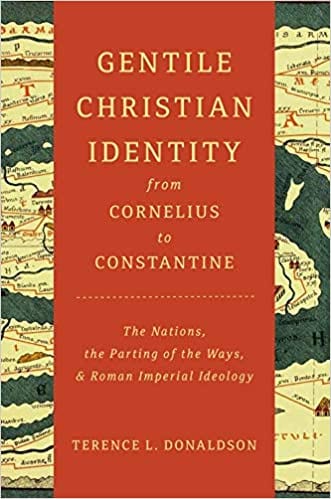Q. Basically your study chronicles how the term ethne goes from being outsider language used by Jews of ‘the other ethnic groups’ and used in mostly the same way by Jewish Christ followers, to it becoming an ‘insider’ term of self-identification for Justin and others thereafter from the late second century on. In some ways this development doesn’t seem terribly surprising since the major of Christians from Justin’s time on actually were from the ethne, and most of them were not Roman citizens and so they were probably familiar with the Roman use of the term for ‘the peoples’ other than Romans. Whatever pejorative flavor the term may have had in the earlier period lost that flavor by the time of the Dialogue with Trypho. You also make clear that this had increasingly negative effects on the way Christians viewed Jews, seeing themselves as taking over the Jewish Scriptures but not seeing themselves in some kind of continuum with earlier Jewish peoples, notions that gave permission for anti-Judaism, and even racial anti-Semitism which becomes ‘the original sin of the church’ as some have called it. My question is just this— How could this development have been avoided, or were the seeds of it inherent already in the early NT period in the writings of Paul and others?
A. This is a tough question, one that I’ve been wrestling with since I first became aware of the long and lamentable tradition of Christian anti-Judaism and its manifestation in more virulent forms of antisemitism. Could it have been avoided? Given the nature of the Christian claims, I think some level of disagreement, argument and polemic was probably inevitable. In the earliest days, when the company of Christ-believers was completely Jewish, this was an intra-mural affair—the kind of sectarian disagreement that was present, for example, in the situation of the Qumran community with respect to the larger Jewish world. As more and more gentiles became believers, these tensions and conflicts shifted into a different register, with an inter-ethnic character.
This much was probably inevitable. But with the rise of the Christian apologists in the mid-second century and the emergence of the proto-orthodox church, some moves were made that could have “been otherwise” (to use a phrase that John Howard Yoder used in this connection). In order to win a favorable hearing among intelligent Greco-Romans, apologists such as Justin faced some specific challenges, having to do with the Roman respect for ancient tradition, on one hand, and the relationship between Christians and Judaism, on the other. The challenges are readily apparent in the work of Celsus (preserved in Origen’s Against Celsus). Though he did not have a great deal of sympathy for Judaism, Celsus nevertheless saw it as preferable to its upstart offspring. While the customs of the Jews may have appeared strange, at least they were in accordance with ancestral tradition. Antiquity was a highly valued commodity in the Greco-Roman world, and a people group that wanted to defend or establish itself as a respected part of that world had to engage in what can be described as competitive ethnography. The Jews had already shown themselves as adept in such identity negotiations (Josephus’s Antiquities of the Jews being the best-known example). Further, it appeared to critics such as Celsus that, in their adherence to these traditions, Jews seemed to have a more legitimate claim to the scriptures on which they were based than did the Christians, who disregarded large parts of the tradition simply in the name of a teacher who had been executed by the Romans and whose messianic credentials hadn’t impressed the Jews. This part of the Christian claim, Celsus charged, implied that the Christian god was capricious—a god who gave one set of good commandments and laws through Moses and then, in an abrupt change of mind, issued another set through Christ.













